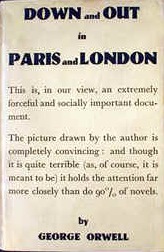
Animal Farm is an allegorical novella by George Orwell, first published in England on 17 August 1945. According to Orwell, the fable reflects events leading up to the Russian Revolution of 1917 and then on into the Stalinist era of the Soviet Union. Orwell, a democratic socialist, was a critic of Joseph Stalin and hostile to Moscow-directed Stalinism, an attitude that was critically shaped by his experiences during the Spanish Civil War. The Soviet Union, he believed, had become a brutal dictatorship, built upon a cult of personality and enforced by a reign of terror. In a letter to Yvonne Davet, Orwell described Animal Farm as a satirical tale against Stalin, and in his essay "Why I Write" (1946), wrote that Animal Farm was the first book in which he tried, with full consciousness of what he was doing, "to fuse political purpose and artistic purpose into one whole".

Jonathan Swift was an Anglo-Irish satirist, essayist, political pamphleteer, poet and cleric who became Dean of St Patrick's Cathedral, Dublin.

Houyhnhnms are a fictional race of intelligent horses described in the last part of Jonathan Swift's satirical Gulliver's Travels. The name is pronounced either or. Swift apparently intended all words of the Houyhnhnm language to echo the neighing of horses.

Down and Out in Paris and London is the first full-length work by the English author George Orwell, published in 1933. It is a memoir in two parts on the theme of poverty in the two cities. The first part is an account of living in near-destitution in Paris and the experience of casual labour in restaurant kitchens. The second part is a travelogue of life on the road in and around London from the tramp's perspective, with descriptions of the types of hostel accommodation available and some of the characters to be found living on the margins.

Homage to Catalonia is George Orwell's personal account of his experiences and observations fighting for the Republican army during the Spanish Civil War. The war was one of the shaping events on his political outlook and a significant part of what led him to write, in 1946, "Every line of serious work that I have written since 1936 has been written, directly or indirectly, against totalitarianism and for Democratic Socialism, as I understand it."
George Woodcock was a Canadian writer of political biography and history, an anarchist thinker, an essayist and literary critic. He was also a poet and published several volumes of travel writing. In 1959 he was the founding editor of the journal Canadian Literature which was the first academic journal specifically dedicated to Canadian writing. He is most commonly known outside Canada for his book Anarchism: A History of Libertarian Ideas and Movements (1962).

"Politics and the English Language" (1946) is an essay by George Orwell that criticised the "ugly and inaccurate" written English of his time and examines the connection between political orthodoxies and the debasement of language.
A polemic is contentious rhetoric that is intended to support a specific position by aggressive claims and undermining of the opposing position. Polemics are mostly seen in arguments about controversial topics. The practice of such argumentation is called polemics. A person who often writes polemics, or who speaks polemically, is called a polemicist. The word is derived from Ancient Greek πολεμικός (polemikos), meaning 'warlike, hostile', from πόλεμος (polemos), meaning 'war'.
Anarchism in the UK initially developed within the context of radical Whiggery and Protestant religious dissent. During the English Civil War and the industrialisation English anarchist thought developed in the context of revolutionary working class politics.

Glumdalclitch is the name Gulliver gives his "nurse" in Book II of Jonathan Swift's Gulliver's Travels. In Book I, Gulliver travels to the land of Lilliput. Leaving there, he travels to the land of Brobdingnag. In Lilliput, Gulliver was a giant, and in Brobdingnag, he is a dwarf, with the proportions reversed.
"Lear, Tolstoy and the Fool" is an essay by George Orwell. It was inspired by a critical essay on Shakespeare by Leo Tolstoy, and was first published in Polemic No. 7.
Polemic was a British "Magazine of Philosophy, Psychology, and Aesthetics" published between 1945 and 1947, which aimed to be a general or non-specialist intellectual periodical.
"The Prevention of Literature" is an essay published in 1946 by the English author George Orwell. The essay is concerned with freedom of thought and expression, particularly in an environment where the prevailing orthodoxy in left-wing intellectual circles is in favour of the communism of the Soviet Union.
"Some Thoughts on the Common Toad" is an essay published in 1946 by the English author George Orwell. It is a eulogy in favour of spring.

Inside the Whale and Other Essays is a book of essays written by George Orwell in 1940. It includes the eponymous essay Inside the Whale.
"Raffles and Miss Blandish" is an essay by English writer George Orwell first published in Horizon in October 1944 as "The Ethics of the Detective Story from Raffles to Miss Blandish". Dwight Macdonald published the essay in politics in November 1944. It was reprinted in Critical Essays, London, 1946.

Critical Essays (1946) is a collection of wartime pieces by George Orwell. It covers a variety of topics in English literature, and also includes some pioneering studies of popular culture. It was acclaimed by critics, and Orwell himself thought it one of his most important books.











